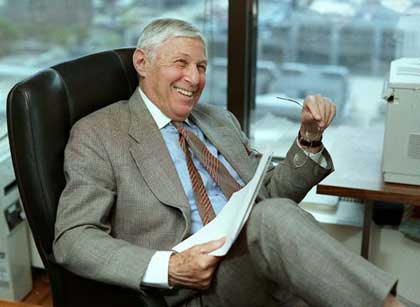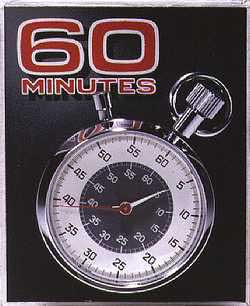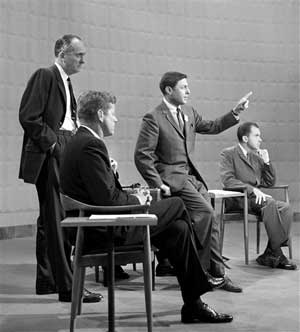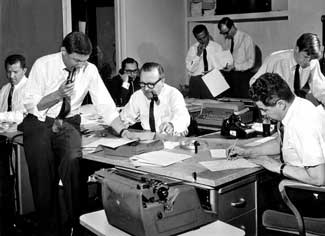
[My "Fresh Air with Terry Gross" tribute to Don Hewitt is broadcast Friday (Aug. 21), and available on the web any time after about 5 p.m. ET that day by clicking HERE. -- David B.]
Compared to CBS producer-director Don Hewitt, who died yesterday at age 86, there aren't many men whose personal experiences and professional accomplishments span so many important events in the history of television. There may not be any -- and that includes Walter Cronkite, whose tenure at CBS Hewitt both preceded and outlasted.
Hewitt's resume, and his value to the maturation of TV news coverage, is, in a word, unparalleled. It is also, in another word, astounding...

60 Minutes, which Hewitt created in 1968, is his most famous TV child, the one that has lived the longest and prospered the most. It has been a Top 10 show in three different decades, and continues to prosper: last week's installment, with an exclusive interview with Michael Vick, was the week's second most popular program.
60 Minutes didn't climb into the season's Top 10 until 1978, after being on the air, in several different time slots, for a decade. It's nestled comfortably, and usually victoriously, in the Sunday 7 p.m. ET slot ever since, delivering some of the best TV journalism of its era... even as the eras changed.
But here's a mind-boggling fact to consider. When 60 Minutes first ended a season in the Top 10, executive producer Don Hewitt already had been at CBS News for 30 years. Thirty. And he would stay for another 25 years, at which point he stepped down as 60 Minutes' producer in 2003.
And before that, his achievements were amazing. When Douglas Edwards and the News became the first CBS evening newscast in 1948, Hewitt was an associate director, and soon was promoted to director and producer. At the first televised political conventions in 1948, Hewitt was at the helm for CBS.
In 1951, when Edward R. Murrow and producer Fred Friendly launched the superb TV newsmagazine See It Now, and Murrow called for an unprecedented split-screen image showing both U.S. coasts at once, Hewitt was the on-camera director at Murrow's side in the CBS control room.

In 1960, Hewitt was the director of the first televised presidential campaign debates, between Richard Nixon and John F. Kennedy. In 1963, he directed CBS's mammoth, wall-to-wall coverage of Kennedy's assassination and funeral.
And so on. Like Forrest Gump, wherever there was a major breaking news event, Don Hewitt was there. He worked with Walter Cronkite as that CBS anchor -- a term coined by Hewitt -- reported most of the major stories of the 1960s. And Hewitt's eventual flagship program, 60 Minutes, made major news of its own, every decade, and continues to do so.
I interviewed Hewitt several times over the years, including for my first book, Teleliteracy: Taking Television Seriously. In that 1992 book, Hewitt extols the virtues of other TV achievements -- Sesame Street, The Civil War -- and admitted that one of the secrets, and charms, of his own 60 Minutes was its stubborn consistency.
"60 Minutes is one of the few things that looks the same as it did when you were a kid," he told me. The gas stations look different, the supermarkets look different, the cars look different. Everything looks different, except 60 Minutes still looks the way it did when a lot of the viewers sat on their fathers' laps and watched it.
 "And over the years people have said to me, 'You know, you ought to change that stopwatch.' I said, 'You've got to be crazy!' I wouldn't change that stopwatch. You know why? That stopwatch is like the squeaky screen door to grandpa's house."
"And over the years people have said to me, 'You know, you ought to change that stopwatch.' I said, 'You've got to be crazy!' I wouldn't change that stopwatch. You know why? That stopwatch is like the squeaky screen door to grandpa's house."
This Sunday, 60 Minutes, fittingly, will devote its hour entirely to Don Hewitt.
And it will begin, just as fittingly, with that same ticking stopwatch...